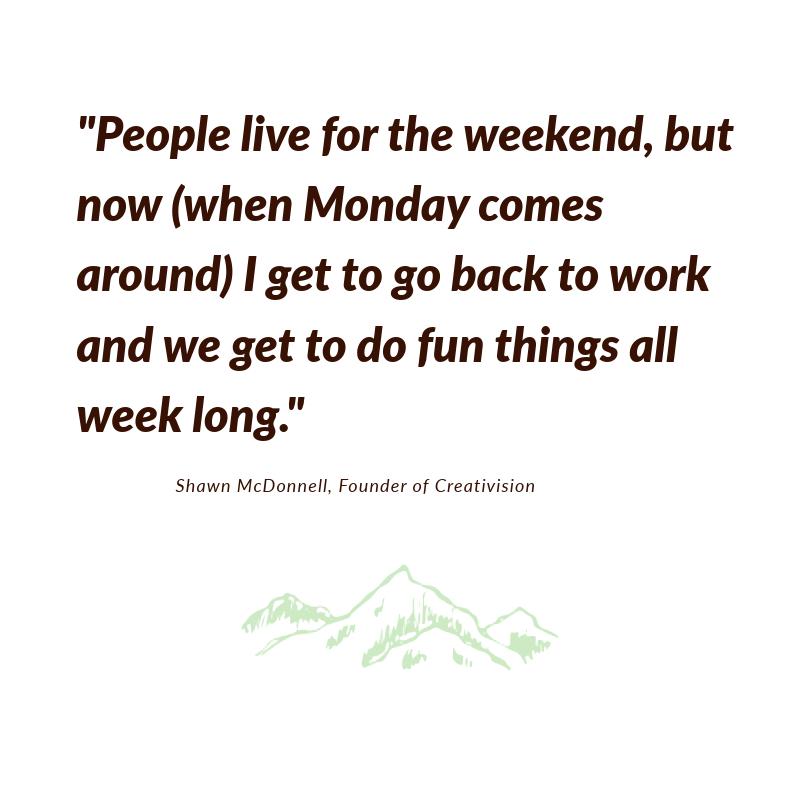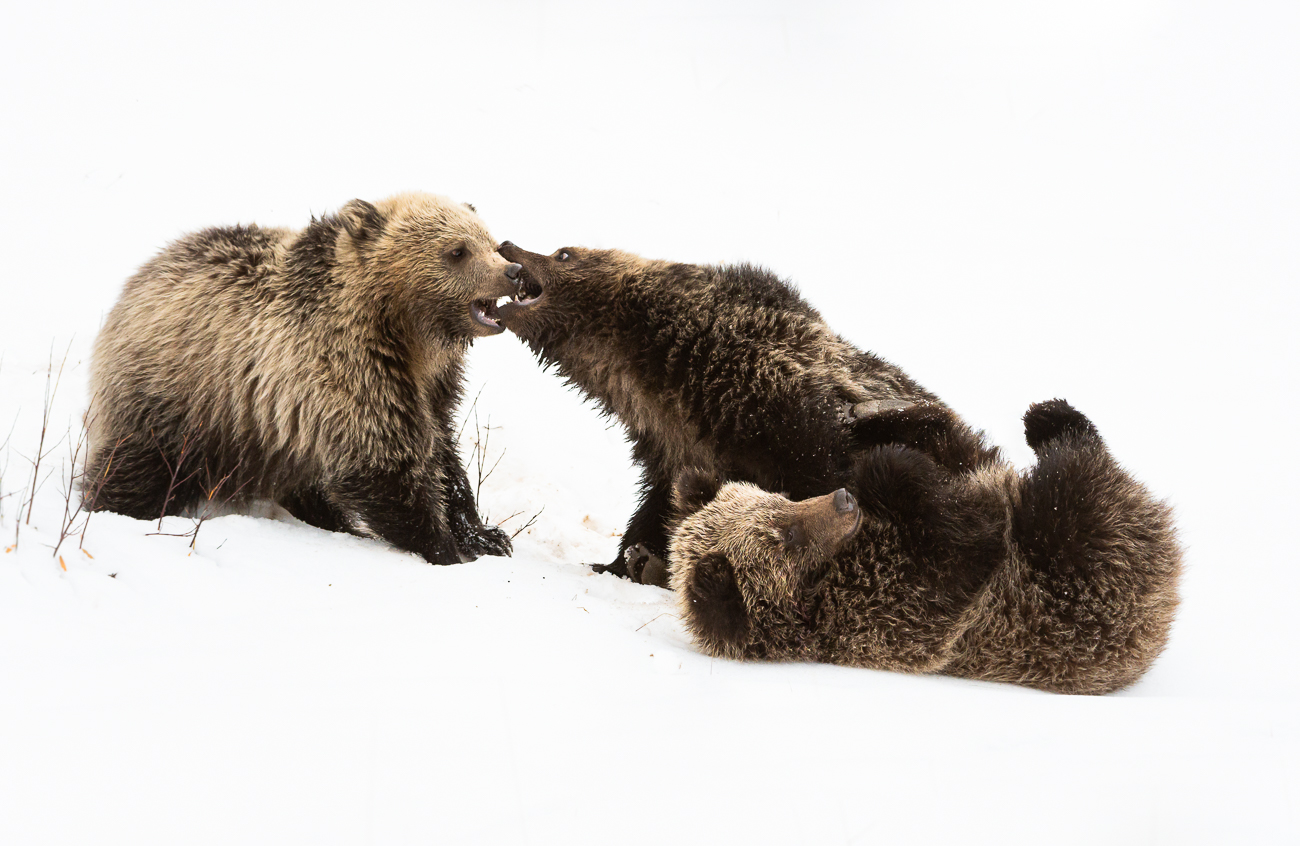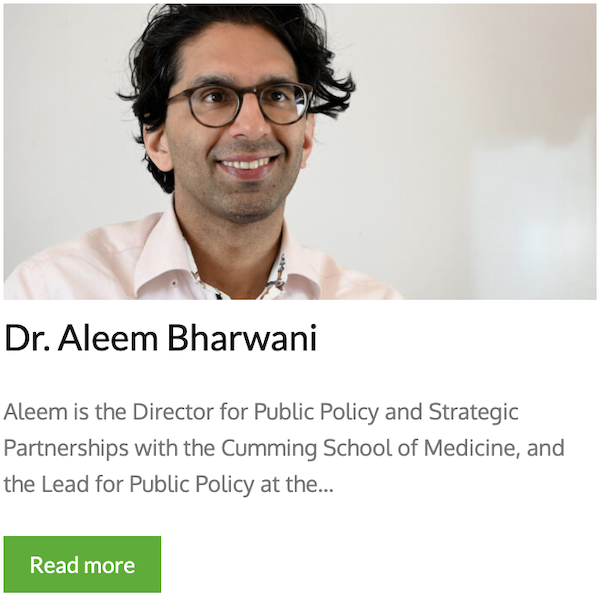The System of Things
Chapter One
“Nobody ever told me that I could actually do something that I actually enjoyed.”
And Shawn MacDonell really wants you to love what you do. He founded Creativision – a wildly successful platform that allows him to gather, shape and tell better stories that celebrate people, life and happiness. It’s like a marketing firm, but the goal is to help good people do better things.
“I thought I was going to be a computer engineer. But I just didn’t like it. I hated every single minute I was doing that work. And I thought, ‘you know what? This is not for me’. I moved back home and kind of started exploring and figuring out what I loved. And now I have a job that isn’t even a job. It’s just a life that includes work that is fun. So, my message to everyone is just do that!”
Which sounds glib, but Shawn says, “Whatever the thing is you love, you can probably get paid for it. You can do it.”
Easier said than done, but also not impossible. And Shawn is proof and point.
Disagree? Think Shawn just got lucky, creating a career like this? He says it’s less about luck and more about choices.
“People overestimate how much it actually costs to live; how much it could take to be happy to live.”
That’s the thing: More is possible if we realize the impact of our choices; if we separate needs from wants.
“You could do the thing you love and you don’t need a million dollars. You don’t have to live in that giant house. You could live in a tiny house and be very happy with it.”
Why does loving what we do matter? Shawn says: “Quality of life. Period.”

Well, maybe semicolon.
“Time. I love my time. People live for the weekend, but now (when Monday comes around) I get to go back to work and we get to do fun things all week long. And I don’t have to worry about Friday.”
Look, this all seems rather intuitive. And, yet, Shawn argues, way too many people end up hating their job – hating their career.
“Most people end up doing something they don’t love because nobody tells them they can do something they do love. Our entire school system is set up to learn the Ford factory model. It’s like ‘go here, get a job, go through these school paces, get a degree, go do this job – whatever that job is – do it for 40 years, retire’. Then you get to live your life. And it’s like everything along the way is pushing you towards that model.”
Shawn’s right, of course.
Like leadership, career paths seem predetermined and rigidly defined. But that doesn’t have to be the case. Shawn says the first key to happiness in career?
“Really spend time with yourself. If you want to tell your own story, you have to know your own story. What is that story? There’s a million people around you telling you what your story could be, should be. It’s like how do you get away from that and really get to know yourself? Well, shut up and spend some time with yourself!”
Shawn continues, “That’s really scary. Like, it’s really scary to ask yourself deep thoughts and inquire, ‘well, what do I really think about this?’ And then you have conflicting thoughts, ‘well, does this make me a bad person?’ You’ve got to figure that all out.”
Maybe you don’t agree, but hear Shawn out.
“One of the things I get to do is work with young people that are coming out of rehab. They want me to do resume writing and cover letter writing with them. But it’s not a thing we can do on week one, or day one. We literally spend four weeks just asking each other questions and spending time with ourselves, with no one around to tell us anything other than what we’re telling ourselves. I think that translates into much better storytelling if you actually know what you want to say.”
After all, Shawn argues, we’re all storytellers because we’re all creating our own story and are all contributing authors to the story of our generation. Shawn believes that to find our passion, our voice, our niche, our dream career, we first need to understand and tell our better story.
To do that? We need to push ourselves and we need to be pushed.
“I was a very quiet kid, and then I won a public speaking contest. That meant you were supposed to go to the gymnasium and speak in front of the whole school. And I was like, ‘well, shouldn’t the loser have to do that?’ The whole time I was uncomfortable, but people kept pushing me. There is no good answer for why I allowed that to happen, but I’ve reflected on that a lot and now see, ‘oh, this was good that people were pushing me.”

It’s why Shawn urges us to “find the people that push you to do things that are uncomfortable. If you’re going to surround yourself with a whole bunch of people that are comfortable, you’re just going to keep doing the same thing over and over again. You’re never going to take a minute to reflect on, ‘is this actually what I want to do?’”
Shawn agrees with what you’re likely thinking.
“That’s very difficult, as a kid. I totally attest to that. But find those people that are doing something crazy and maybe they’re not crazy (and they’ll push you to do something incredible).”
And when we encounter that roadblock?
“Problem solve. I wish I could go back and tell myself every time I self-doubted myself to be a better problem solver.”
Almost every obstacle – almost every challenge – in career, in mission and in life can be overcome if we take the time to think critically and work to problem solve.
When we don’t? We lose sight of our dreams. However, when we do? We can realize them.
But not all dreams are obvious, especially at an early age, as Dr. Aleem Bharwani recalls.
“I would think in the future, ‘oh, I wonder if I did this’ or ‘it’d be cool if I did that’. And I would find people or situations inspiring, but I wouldn’t say I had some unique dream, or some sort of very clear perspective of where I’m going to go and what I’m going to do. I had a sense of it: I liked to do this, or I wanted to work hard to do these things, but ultimately I just discovered parts of me.”
Aleem helps oversee the Cumming School of Medicine at the University of Calgary and is a community builder in every sense. To reach this dream, Aleem recalls, “I did manual labour work. I did landscaping work. I did retail work. I researched in a molecular cell biology lab. My cousin and I tried to start a business. We looked at building an electronic medical record system. We started drafting code for that. So, I did different things when I was young. I would volunteer or do whatever interested me.”
And along the way, Aleem picked up this advice from his mentor, which he offers to us:
“You have this flask – let’s say it’s of liquid. Every time you’re pouring something in from the top, let something go from the bottom. At any given time, always be 80% full so you can always let something new come in from the top – a new idea, some new area of interest – but then always decant something that you’re least interested in or least involved in.”
Aleem continues, “That way, at any given time, you’re very much aligned with who you are and what you enjoy and what interests you. I think if you do that, over time, you find paths, you find opportunities, you find people and communities that really link with who you are and what you’re good at and what you want to be doing.”
That’s how manual labour as a teenager led to a role designing public health policy as an adult. And it’s why, Aleem explains, “Visioning 25 years ahead is a good idea, but I don’t think you have to be beholden to it. I think you should do that exercise so that you’re thinking long term, but then be agile through the moments.”
Aleem adds, “What you might find is that your long term vision, there was something about it that really captured who you were, but in a different space or at a different point in time. So, that exercise is good to get to know yourself, but then stay agile. Agile without being flippant. Be discerning; be thoughtful. But allow yourself new experiences and new opportunities so that you are, at any given moment, exactly where you ought to be – and with interesting people.”
And that matters, according to Paul McIntyre-Royston – he’s the fundraiser who has helped hospitals, libraries and even Olympians accomplish their dreams.
“I fundamentally recognize that for me, there is just this. There is one opportunity, one life to make a difference, to change things. I’m going to have low moments; I’m going to have times where I’m feeling lazy and just want to sit on a couch. But, fundamentally, there is just this one opportunity to change the world.”
One chance to change the world. One chance to be happy, to live the life we each dream for ourselves.
What we must remember, even if it isn’t always obvious or obvious today, is that each of us has a passion; we just need to uncover what it is.
Passion is, so often, what drives commitment. We’ll commit to what we love and what makes us happy – what we can’t live without.
When we combine passion and commitment with our natural skillset, we begin to find our unique role – that one thing we can do better than anyone.
And that’s not a job. It’s a vision. It’s a belief in self and community. It’s an understanding that things can be different, better even.
Most importantly, it’s a launch pad for dreams. And when dreams are balanced with critical thinking and creative action, we can find new ways of doing and living – new models of success and happiness.
Indeed, we can find careers of meaning – a life of meaning.
Which is why this is important to remember:
Even when so much of life seems determined by circumstances and systems out of our control, we must remember there is still so much we can control.
And as our two bears taught us – reminded us – if we can dream bigger and do better in this system – in any system – why wouldn’t we? Why not try for that bigger, better dream for our lives and for our world?



